

Mind Hacks. Creating Passionate Users. My Favorite Graphs... and the future This blog has always been about optimism, creating better user experiences, helping users spend more time in flow, and learning.
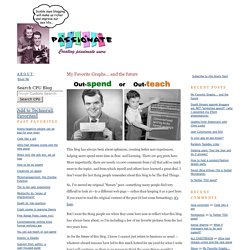
There are 405 posts here. More importantly, there are nearly 10,000 comments from y'all that add so much more to the topics, and from which myself and others have learned a great deal. I don't want the last thing people remember about this blog to be The Bad Things. So, I've moved my original "threats" post--something many people find very difficult to look at-- to a different web page -- rather than keeping it as a post here. But I want the thing people see when they come here now to reflect what this blog has always been about, so I'm including a few of my favorite pictures from the last two years here.
I made no money from this blog -- it was always a labor of love. That leaves me with... what to do next? 1) Get a real job doing this, so that I can continue with the same kind of work, but without raising my own visibility. The Complete Practitioner. Neural Gourmet. The Beginning. How to Feel Confident. Edit Article Help Building ConfidenceTricking Your BrainWorking from the Outside InPracticing, Practicing, Practicing Edited by Hannah, DrLynx, Tom Viren, Ben Rubenstein and 92 others You might have already read and learned how to be confident, but what if you still don't feel all that confident?

Sometimes it takes your emotions a little bit of time to catch up with your behaviors, but you can help to move the process along. Perhaps all you really need is some working out and dressing up to feel better, or maybe you can start with thinking positively and smiling more often. Ad Steps Part 1 of 3: Tricking Your Brain 1Think positively. 3Smile. Part 2 of 3: Working from the Outside In 1Dress sharp. How To Stop Procrastinating. Mindfulness & Mindlessness in Persuasion.
Richard Petty & John Cacioppo, at Ohio State University, have described what is to date one of the most fundamental differences in receptivity to an influence attempt: the target will respond either centrally or peripherally.
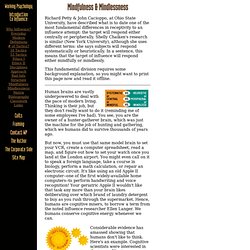
Shelly Chaiken's research is similar (New York University), although she uses different terms: she says subjects will respond systematically or heuristically. In a sentence, this means that the target of influence will respond either mindfully or mindlessly. This fundamental division requires some background explanation, so you might want to print this page now and read it offline. Human brains are vastly underpowered to deal with the pace of modern living. Three Laws Of Memory. "Nature is an endless combination and repetition of a very few laws.
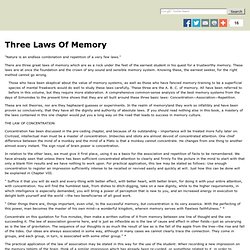
" There are three great laws of memory which are as a rock under the feet of the earnest student in his quest for a trustworthy memory. These laws are at once the foundation and the crown of any sound and sensible memory system. Knowing these, the earnest seeker, for the right method cannot go wrong. Those who have been skeptical about the value of memory systems, as well as those who have fancied memory-training to be a superficial species of mental freakwork would do well to study these laws carefully. These three are the A. These are not theories, nor are they haphazard guesses or experiments. New Scientist 11 steps to a better brain - By Kate Douglas, Alison George, Bob Holmes, Graham Lawton, John McCrone, Alison Motluk and Helen Phillips It doesn’t matter how brainy you are or how much education you’ve had – you can still improve and expand your mind.
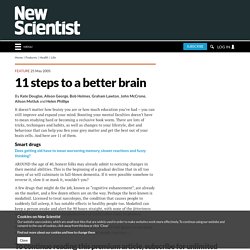
Boosting your mental faculties doesn’t have to mean studying hard or becoming a reclusive book worm. Unskilled and Unaware of It: How Difficulties in Recognizing One. Selected Article © 1999 by the American Psychological Association For personal use only–not for distribution December 1999 Vol. 77, No. 6, 1121-1134 Unskilled and Unaware of It: How Difficulties in Recognizing One’s Own Incompetence Lead to Inflated Self-Assessments Justin Kruger and David DunningDepartment of PsychologyCornell University Abstract People tend to hold overly favorable views of their abilities in many social and intellectual domains.
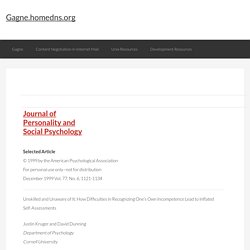
The authors suggest that this overestimation occurs, in part, because people who are unskilled in these domains suffer a dual burden: Not only do these people reach erroneous conclusions and make unfortunate choices, but their incompetence robs them of the metacognitive ability to realize it. Across 4 studies, the authors found that participants scoring in the bottom quartile on tests of humor, grammar, and logic grossly overestimated their test performance and ability. We bring up the unfortunate affairs of Mr. Imperfect Self-Assessments Method. Neuroscience Sheds New Light on Creativity - Rewiring the Creati. How to Exercise an Open Mind - WikiHow. Edit Article Edited by Sam Rawlins, Krystle C., Richd, Erika Altek and 105 others One hour of increased brain activity via innovative thinking or experiencing new stimuli can make you smarter, more energetic, more creative, more sociable, and more open to new experiences and ways of thinking.
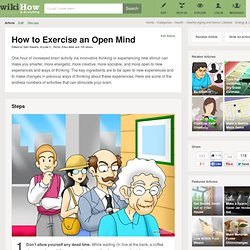
The key ingredients are to be open to new experiences and to make changes in previous ways of thinking about these experiences. Here are some of the endless numbers of activities that can stimulate your brain. Ad Steps 1Don’t allow yourself any dead time. 20Browse something that you are not familiar with the internet.
Tips Become more like an inquisitive child. Warnings Exercising an "open" mind and "stimulating" your mind are different.